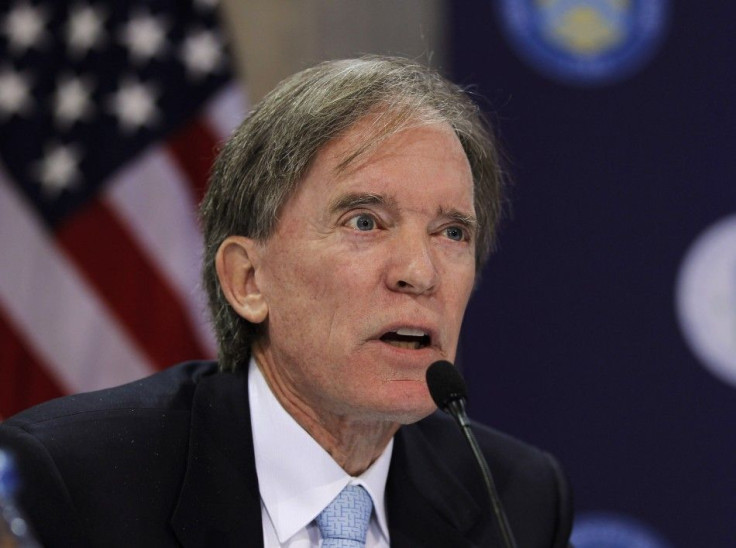PIMCO's Bill Gross: Betting Against U.S. Debt a Mistake, New Recession Odds High

Even PIMCO's Bill Gross makes a wrong call every now and then.
Gross, manager of the world's largest bond fund noted for calling the housing bubble early on that burst several years ago, said he feels like crying in his beer for betting so heavily against U.S. government-related debt this year.
Gross said PIMCO had dumped almost all of its U.S. debt holdings in March because he thought U.S. growth would be higher than it has been, resulting in inflation in the future. But GDP numbers for the U.S. show this year the economy has been barely growing at all, at just above one percent.
As a result, the performance of PIMCO's Total Return Fund has been impacted by Gross' big bet that turned out wrong. As Treasuries rallied, PIMCO's Total Return Fund lost 0.97 percent in the past four weeks, while the benchmark Barclay's U.S. Aggregated Bond Index rose 0.23 percent in the same period.
Gross, who oversees $1.2 trillion at PIMCO, told the Financial Times it was pretty obvious he wishes in hindsight he had more Treasures in his portfolio at the moment.
When you're underperforming the index, you go home at night and cry in your beer, he told the Financial Times. It's not fun, but who said this business should be fun. We're too well paid to hang our heads and say boo-hoo.
Forecasts early this year had suggested the U.S. economy would grow at 2 percent or higher. Revised GDP numbers provided for the first quarter of this year from the government revealed almost no growth at all, while growth in the second quarter was just above one percent.
I get that it was my/our mistake in thinking that the U.S. economy can chug along at 2 percent real growth rates. It doesn't look like it can, Gross said.
Gross said investors were pricing a higher probability of recession in the U.S. earlier in August when U.S. Treasuries fell to 60-year lows. In May, he said the only way PIMCO would purchase again was if the U.S. went into another another recession. He told the Financial Times his view on the U.S. economy has significantly changed earlier this month after the Federal Reserve promised to keep interest rates low for at least another two years.
Freezing rates for two years, that was a pretty significant statement in terms of the vulnerability of Treasuries to go down in price and up in yield, Gross said in the Financial Times.
Gross, one of the world's most powerful money managers, is also among the most outspoken. In 2005, for instance, Gross called both the housing bubble bursting and the oncoming recession while many economists, including key government officials, said the housing bubble might only burst regionally and a recession might not be that severe.
Also, Gross was highly critical of GE in 2007, citing the company's high risky exposure to commercial paper. He came under fire from GE CEO Jeff Immelt for that sentiment, but in 2008 GE had to get government assistance through a commercial paper backstop when the company faced potential disaster in the financial crisis as credit dried up.
Gross' admission of betting the wrong way on U.S. economic growth comes just one week after he said in an interview that a new recession in America has better than 50-50 odds.
It is increasingly apparent to us that policy options are limited and that economic growth is slowing down, said Gross, who oversees $1.2 trillion as co-chief investment officer at Pacific Investment Management Co., or PIMCO, in an interview with Reuters Insider television.
The U.S. economy has officially been out of recession for two years, but fear of a new recession have grown amid reports the economy is barely growing at all and consistently high unemployment, remaining above nine percent.
Recession is not inevitable, but I think there's better than a 50-50 chance, said Gross, in the Los Angeles Times.
In mid-August investment bank Morgan Stanley warned in a research note that the U.S. and euro zone are dangerously close to recession. Morgan Stanley cut its U.S. GDP forecast.
There's no doubt that growth from the standpoint of employment or unemployment and growth from the standpoint of corporate profits is definitely a risk -- whether or not we see a positive 1 percent real GDP number I think is besides the point, Gross said.
Gross told Reuters that low Treasury yields at 1.98 for a 10-year U.S. Treasury note signal recessionary conditions.
They certainly reflect, in terms of yields, not only a potential for a recession but the almost high probability of recession and the result of lowering of inflation -- that is a key, he said.
© Copyright IBTimes 2025. All rights reserved.





















